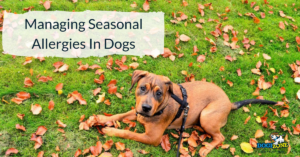Managing Seasonal Allergies In Dogs
Dogs Can Have Allergies Just Like Humans!

Dogs, just like people, can have allergic reactions to different things in the environment. Some of these triggers are seasonal, which means they only occur at particular times of the year. I have some ways that you manage allergies in dogs.
Spring and autumn are the two most common types of seasonal allergies in dogs. However, during the summer months or if a dog is kept indoors in the winter and exposed to specific residue cleaners or specific types of air fresheners or similar products, allergic reactions can occur.
Most seasonal allergies are classified as environmental. In other words, these allergens are not a result of food-related reactions. Examples of seasonal allergies may be to pollen, grass, molds, spores and even to specific types of vegetation and weeds.
Common Symptoms
When humans have an allergic reaction, they typically have cold and flu-like symptoms with runny noses, swollen eyes, coughing and difficulty in breathing. Dogs have very different symptoms, which typically include extreme itching of the skin.
This is correctly known as allergic dermatitis, which simply means an inflammation of the skin. Dogs will scratch, rub, bite and lick. This can be significant and damage the surface of the skin, leading to secondary bacterial infections.
If untreated, these areas can turn into hot spots. These appear as small to large areas of very red skin that is hot to the touch. The skin may bleed or have a liquid seeping from the surface. There may be secondary skin infections, loss of hair and even scarring of the skin.
Dogs may also develop inflammation in the ear canal if they have an allergic reaction. The ears are usually hot to the touch, and the dog will scratch or shake his or her head. This is often accompanied by a yeasty, foul smell around the head, often with a discharge.
Some dogs may get the red, itchy and runny eyes as well as the respiratory problems that humans experience. This is typically most often seen with older dogs or dogs with other health issues, particularly issues with the respiratory system.
Treatment
Talk to your vet about treatment for allergies. Some pets with mild reactions can be bathed frequently with oatmeal or aloe soaps to reduce skin irritation when the allergen is present. Your vet may prescribe a hypoallergenic dog shampoo. However, it is important to avoid over-bathing the dog as this can further dry out the skin and create irritation and itching.
Supplements to a dog’s diet including the addition of Omega-3 supplements can help to alleviate the symptoms, and other holistic vets recommend the application of coconut oil in the food as well as on the irritated skin areas. Vacuum the house frequently, paying particular attention to anywhere the dog sleeps or spends time. Dog bedding should be washed frequently as well to remove any allergens.
Do not give human allergy medications to your dog. Talk to your vet for specially formulated medications for dogs based on their body weight. Steroid shots may also be recommended with extreme or chronic types of allergic reactions.

